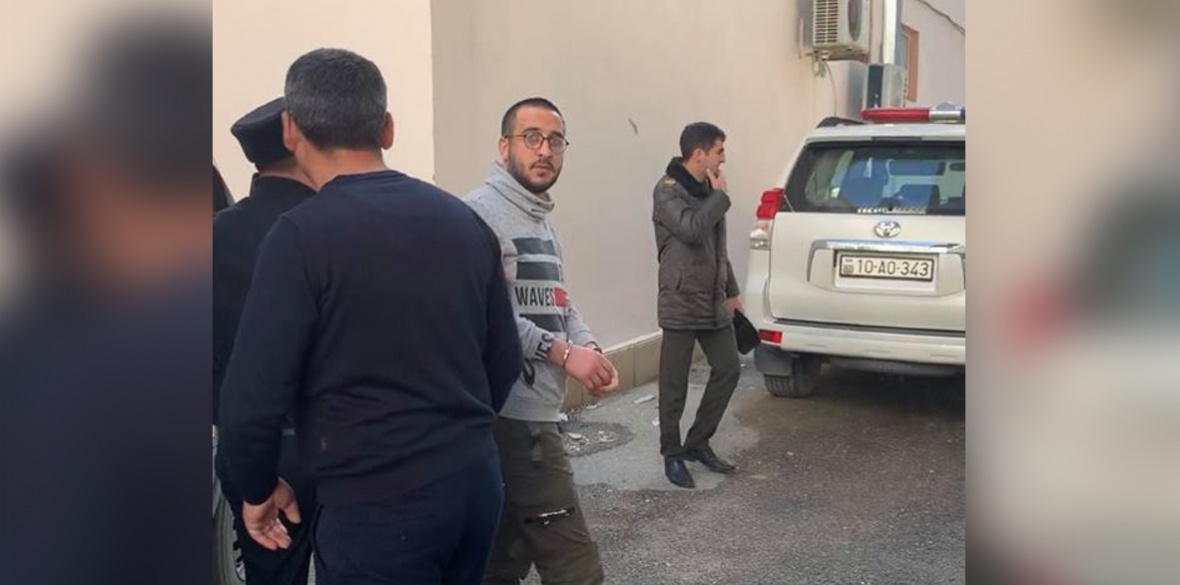This is the last article you can read this month
You can read more article this month
You can read more articles this month
Sorry your limit is up for this month
Reset on:
Please help support the Morning Star by subscribing here
WHILE representatives from the European Union and Azerbaijan were busy hashing out a new trade agreement at the 16th EU-Azerbaijan Co-operation Council last Thursday, the latter’s government spent the week jailing activists, journalists and minorities.
The EU’s foreign affairs chief Federica Mogherini told reporters at a press conference after the meeting that “inshallah” the EU and Azerbaijan will soon finalise the agreement.
“Azerbaijan is a very important partner for the European Union, whose independence, sovereignty, and territorial integrity the EU fully supports,” Mogherini said, referencing the country’s ongoing and under-reported conflict with Armenia.
“We are currently in an important phase of negotiations, because we are hopefully in the final crucial phase of negotiating our new, ambitious bilateral agreement, which I am sure will increase and deepen our relations.”
Both parties want to seal the deal quickly. The EU is eager to complete the Southern Gas Corridor — a series of pipelines stretching from Azerbaijan 2,220 miles to Italy carrying fossil gas that environmentalists say is as climate-damaging as coal.
Azerbaijan, of course, wants to keep receiving the millions upon millions of euros the EU has thrust at it to help its state-owned oil company finish the project and use that to prop up its corrupt regime.
The reason you almost never hear about Azerbaijan and its litany of human rights abuses in the press is because the country’s kleptocratic ruler, President Ilham Aliyev —who has run the show since his father died in 2003 — allows both Western and Russian corporations to exploit the fossil fuels it has in abundance underground.
Amnesty International summed up the human rights situation there last year as follows: “Authorities intensified the crackdown on the right to freedom of expression, particularly following revelations of large-scale political corruption.
“Independent news outlets were blocked and their owners arrested. Critics of the government continued to face politically-motivated prosecution and imprisonment following unfair trials.
“LGBTI individuals were arbitrarily arrested and ill-treated. Suspicious deaths in custody were still not effectively investigated.”
To be fair, Mogherini did allude to the country’s crimes in her speech at the press conference. She told reporters the EU and Azerbaijan had “addressed important issues such as democracy, rule of law and the respect for human rights” during the negotiations.
“We still observe a limited space for civil society and human rights defenders in Azerbaijan,” Mogherini added.
“We welcome the recent pardoning of political prisoners by President Aliyev.”
On March 16 ahead of Nowruz, the Persian new year, Aliyev issued a presidential decree ordering the release of 399 people from jail, around 50 of whom were political prisoners.
Dozens of political prisoners were not on the list, however, including journalists Afgan Mukhtarli and Seymur Hazi.
The young political activists and pro-democracy bloggers Bayram Mammadov and Qiyas Ibrahimov were two of the people released that day.
Underneath a statue of former president Haydar Aliyev, Mammadov and Ibrahimov spray painted “Happy Slave Day” and “Fuck the system,” as well as the anarchist circled-A symbol one night in May 2016.
The next day they were beaten and threatened with sexual assault by the cops and forced to sign a confession which said they were carrying heroin (a surprising number of government critics have been sent down for allegedly possessing drugs).
On March 30, just two weeks after his surprise release, Mammadov was arrested again; this time for being “insubordinate to the legal demands of the police” and sentenced to 30 days’ detention.
The day before the EU-Azerbaijan meeting in Brussels on April 3, Mammadov appeared in court to appeal the charge and told the judge the police had tortured him.
The young man showed the court the bruises on his face, his swollen nose and ears, and pointed out the policemen responsible for them in the room.
The judge rejected Mammadov’s appeal but did order an investigation into his torture. However, according to Azerbaijani political prisoners’ advocate Elshan Hasanov, “no-one is punished for torture, because the very possibility of inhuman and cruel treatment is rejected.”
Activists shared reports on social media from other political prisoners last week that Mammadov has been badly beaten, that he has received serious traumas on his head and is dizzy all the time.
Later, Mammadov’s friend posted the following words on social media from a letter Mammadov wrote in prison:
“[The police] brought me to the administrative detention point and within couple of hours, with no official reason, put me in a rubber room.
“Later five to six other police offivers began beating me with their fists and feet. I lost balance and fell on the floor. Even then they continued to kick me in the face. It lasted at least 30 to 40 minutes.
“When they took a break from beating me, they asked why I showed no regret in my social media posts. Later they handcuffed my hands and legs and put me on my belly.
“I am asking your help to investigate all these tortures against me.”
On the same day Mammadov was in court, Ibrahimov was escorted to a police station for a “preventive conversation” concerning a Facebook post which the cops claimed was insulting the president.
The police, Ibrahimov told journalists outside the police station afterwards, “had printouts of my social media status which they said insulted the president by calling him a dictator.
“They did not have any actual proof that I have insulted him. So they tried to intimidate me.”
The police warned Ibrahimov that they could not help him if Aliyev’s supporters decided to “reason with him on the street.”
On the same day as the EU-Azerbaijan conference, four activists from an opposition political party, called the Azerbaijan Popular Front Party, were arrested while seeking permission to hold a rally and sentenced to 30 days in prison. More than 50 members of the party have been arrested this year.
Also on April 3, the day before the conference, four transgender prostitutes were arrested and forced to take medical examinations in raids the country’s LGBT community fear are reminiscent of tyranny inflicted upon them last year.
Amnesty describes last year’s crackdown as follows: “On September 22, more than 100 LGBTI individuals were rounded up by the police in public spaces and detained.
“Some were released, but at least 48 were sentenced to administrative detention, ranging from 10 to 20 days. They were accused of “resisting police’s legitimate orders,” and found guilty on the basis of police officers’ allegations, without any further evidence.
“The summary hearings fell short of international trial standards. The detainees said they had been beaten by the police and subjected to other ill-treatment while in custody. All were released on October 2.”
Prostitution is illegal in Azerbaijan, however, according to the Baku-based human rights lawyer Samad Rahimli, LGBT sex workers are disproportionately targeted.
“Police use bogus charges against transgender sex workers to de facto punish them for their behaviour,” Rahimli said.
“In these cases they act not with legitimate law enforcement interests but with a moral agenda.”
As the podcaster and political exile Zamira Abbasova told me in an interview for the Star last month, the EU and the West “are blind to the human rights situation happening inside the country.”
“Azerbaijan’s newly implemented ‘reforms’,” Abbasova told me this past weekend, “such as releasing prisoners and renewed negotiations with Armenia, are due to the EU agreement that is being considered now. It is all just for show.
“The EU needs to be more vigilant and unforgiving towards the country’s political elite before accepting the agreement.”
A report last week showed carbon dioxide levels are the highest they’ve been in three million years, when sea levels were 20 metres higher.
Signing up a dodgy deal with Azerbaijan’s human rights abusing kleptocrats to ease the completion of the Southern Gas Corridor, which is predicted to release as much carbon dioxide into the atmosphere as the annual emissions of Bulgaria, is a disgrace on so many levels.
Ben Cowles is the Star’s web editor. He can be reached on Twitter via @Cowlesz.

 Ben Cowles
Ben Cowles









